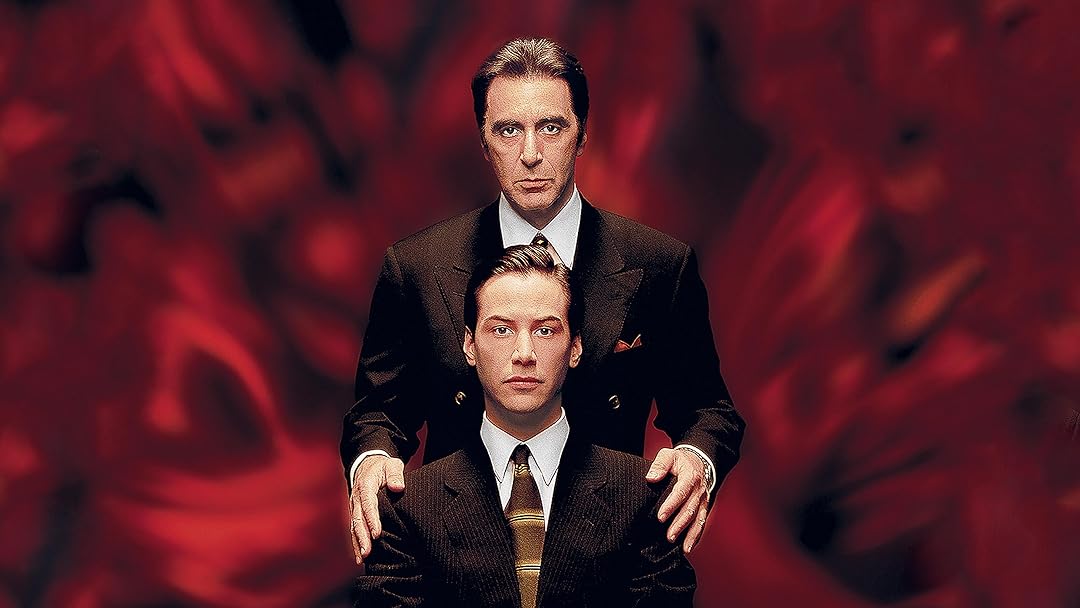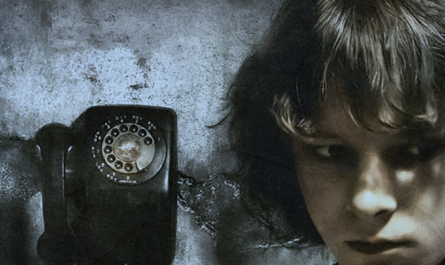“The Devil’s Advocate” (1997), directed by Taylor Hackford, follows Kevin Lomax, a brilliant young defense attorney from Florida who has never lost a case. After winning a morally questionable trial, he is recruited by a powerful New York law firm led by the charismatic John Milton. As Kevin rises in the firm, his wife Mary Ann suffers disturbing visions and descends into madness, warning him of evil forces around them. Kevin becomes increasingly consumed by ambition, ignoring the moral cost of his victories. Eventually, he learns that Milton is actually Satan, who wants Kevin to father the Antichrist with his half-sister, Christabella. In the climax, Kevin refuses to go along with the plan and chooses to end his life by shooting himself. However, the film ends with a twist: Kevin suddenly awakens back in the courtroom of his earlier trial in Florida. He was given a second chance. Though he resolves to do the right thing, a reporter tempts him with promises of fame, and the final scene reveals Milton, disguised as the reporter, smiling. The end suggests that temptation and corruption remain inevitable.
Although the movie primarily focuses on the powers of temptation and corruption, particularly their devious nature, it also critiques Kevin’s moral code as a lawyer. Shortly after arriving in New York, Kevin is assigned to defend Alexander Cullen, who is accused of murdering his wife and children. Cullen insists he is innocent, and he is desperate because he isn’t allowed to see his stepdaughter. Kevin defends him and convinces Cullen to be open about his alibi and say he was with his secretary spending the night. Cullen refuses at first, but eventually accepts, and Kevin interrogates his secretary. As he asks the questions, he realizes the secretary had been lying all along, as well as Cullen. In the end, Kevin proves Cullen’s innocence. This is the climax of the movie, and when things start to spiral, one of the most important partners in the firm, Eddie Barzoon, is murdered by a homeless man in the park, but in reality, it was Milton who murdered him because he wanted Kevin to take Barzoon’s place at the firm.
At Barzoon’s funeral, Kevin sees Cullen sensually caressing his stepdaughter’s back. At that moment, Kevin felt incredibly guilty for granting freedom to a devious man capable of murdering his wife and children to stay with his stepdaughter. The movie criticizes power and attorneys defending unlawful individuals as immoral. Kevin gets approached by an agent claiming Milton’s firm was being investigated for money laundering, international corruption, subverting justice, and protecting criminals.
The film is very clear in critiquing firms or lawyers who represent wrongful doings. But is it immoral to defend a criminal? This is a long and old dilemma which reminds me of the play “Prima Facie” (2022) and the Argentinian short film “La Propuesta” (The proposal) in “Relatos Salvajes” (Wild Tales 2014).
“Prima Facie” (2022) is a monologue written by Suzie Miller, centered on Tessa, a sharp, ambitious barrister in London who specializes in defending men accused of sexual assault. At the start, Tessa is confident, witty, and unapologetic about her success in the male-dominated legal world. She prides herself on mastering the rules of the game, even when that means dismantling the credibility of women who testify against her clients. Her perspective completely changes when she is sexually assaulted by a colleague. She is then forced to navigate the legal system she once manipulated. Tessa experiences firsthand how the law is stacked against victims, its reliance on “objective evidence” erasing lived female experience. The play delves into gender inequality and women being failed by a system designed for men. In the end, Tessa critiques the courtroom and the need for systemic change.
“La Propuesta” (“The Proposal”), is one of the six stories in “Relatos Salvajes” (Wild Tales, 2014). It begins when Santiago, the son of a wealthy family, drunkenly runs over a pregnant woman in a hit-and-run. His father, Mauricio, desperate to protect him, comes up with a plan: the family’s longtime groundskeeper, José, will take the blame in exchange for a large amount of money. As they negotiate the terms, lawyers and a prosecutor arrive, each keen on profiting from the scheme. What starts as a calculated deal becomes a grotesque bargaining game where everyone raises the price for their silence and cooperation. The final scene shows José being arrested as the scapegoat and brutally murdered by the woman’s husband. The end shows how justice has been completely swallowed by money, influence, and selfish interests.
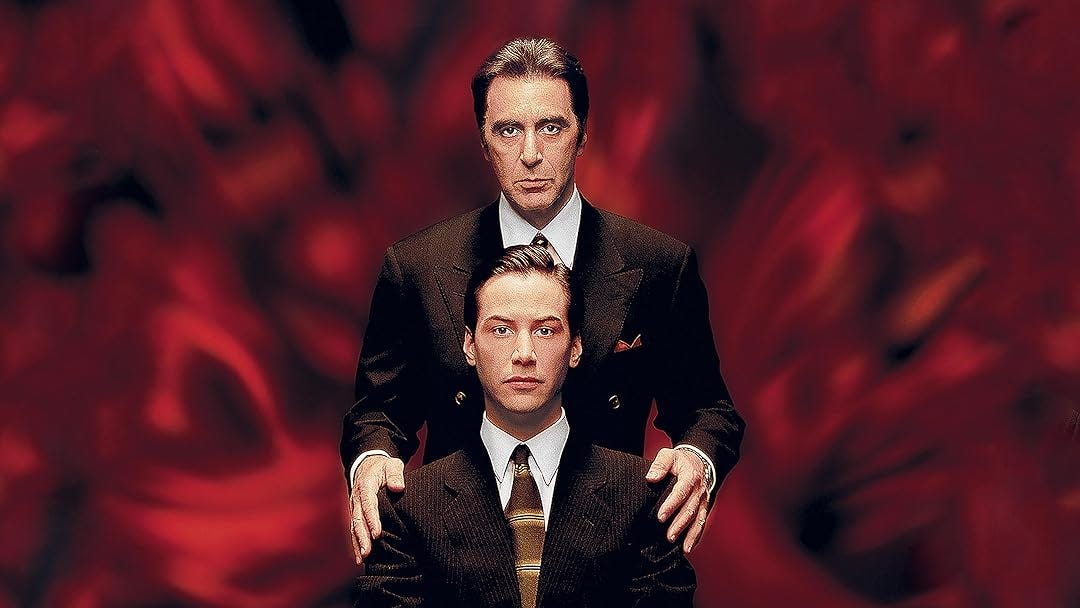
Regency Enterprises. Warner Brothers. Kopelson Entertainment. 1997.
Should lawyers have a moral code?
Yes. Next question.
Just kidding! Of course, they have one, but it’s more nuanced than how it’s portrayed in “The Devil’s Advocate”. We could say a lawyer’s moral code is the following:
· Lawyers must have Professional Integrity and Honesty, meaning they must be truthful and avoid misleading statements. They must also act with integrity.
· Lawyers must respect Client Loyalty and Confidentiality: Lawyers have the duty to protect their clients’ information.
· Lawyers must Respect the Legal System: By all means, they must use legal procedures for legitimate purposes and respect the courts, judges, and other legal professionals.
· Lawyers must show Competence and Diligence: They must provide services competently based on reasonable efforts to prevent errors.
· Lawyers should promote access to the legal system: This means they should contribute to the improvement of the law and work to strengthen the public’s confidence in the law.
· Lawyers must avoid Conflicts of Interest: Meaning, they must avoid situations where their personal interests conflict with those of their clients.
Indeed, Kevin was an immoral lawyer because he didn’t respect the judges. For example, he would choose biased juries and manipulate them in his favor. He didn’t respect the legal system, and he didn’t promote access to the legal system, as he was more focused on his personal ambition and ego. He also realized the secretary was lying before defending Cullen on his last trial; in other words, he wasn’t honest and didn’t act with integrity. But there is a bigger problem than Kevin, and that’s a failed system.
A lawyer’s, especially an attorney’s, role is to work on the defense of the accused. Each lawyer must put in all his or her effort to work on serving justice and defending their client as best as they can. They are not omnipresent beings with the capacity to be everywhere all at once, nor consider everyone’s perspective individually. That is what the judge and the jury are for; they are not omnipresent either, but they should be objective and listen to the facts based on extensive research and provided by each lawyer. The ones in charge of seeking ultimate justice are, again, the judge and the jury. Their morality lies in acting within the borders of the legal system.
Is it the Lawyer’s Fault or the System We Live In?
Kevin, Tessa, and Mauricio start as arrogant characters who feel in control of their destiny and their circumstances, especially with the law by their side. Although the law is supposed to be objective and arbitrary, characters like this show that there is a fine line between being objective and pursuing justice, and knowing how to play your cards. What I mean by that is that, unfortunately, there are cracks in the system that allow people to get away with crimes solely because their guilt wasn’t proved.
Being innocent until proven guilty is a human right, there is no denying that, but what happens when the signs of a crime are there, but haven’t been proven? And, of course, many people have no issues lying and being corrupt, like Mauricio. Mauricio had the means to guarantee his son’s freedom and had no shame in doing so. Unfortunately, as humans can lie, getting to the bottom of things can be very complicated.
“The Devil’s Advocate” puts Kevin as the ill-intended, but Cullen getting away with murder is bigger than Kevin. Instead of focusing on the attorney’s victory, we should focus on the prosecutor’s and the jury’s failure.
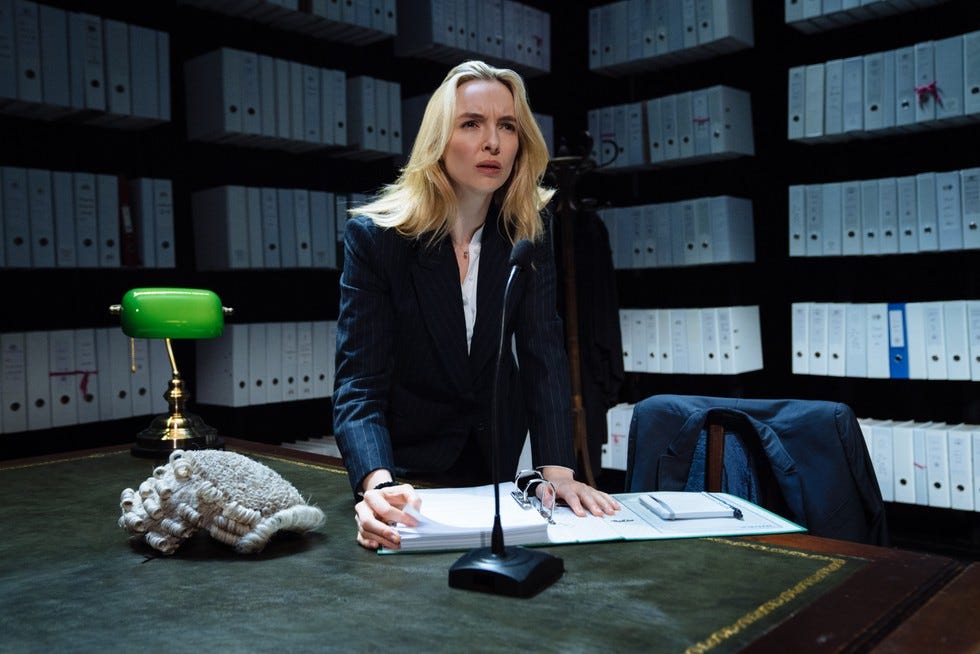
Empire Street Productions. Eleanor Lloyd Productions. Film Nation Entertainment. 2022.
Is the Legal System Failing Women?
“Prima Facie” is clear with its judgment of the legal system and how it fails women. At the end of the monologue, Tessa loses the trial, but she grows personally and changes her perspective on victims of sexual abuse. The lights turn on, and Tessa addresses the audience, telling them the legal system is broken and needs to support women. She ends up telling the audience to look to their left and their right, that one in three women is a victim of abuse.
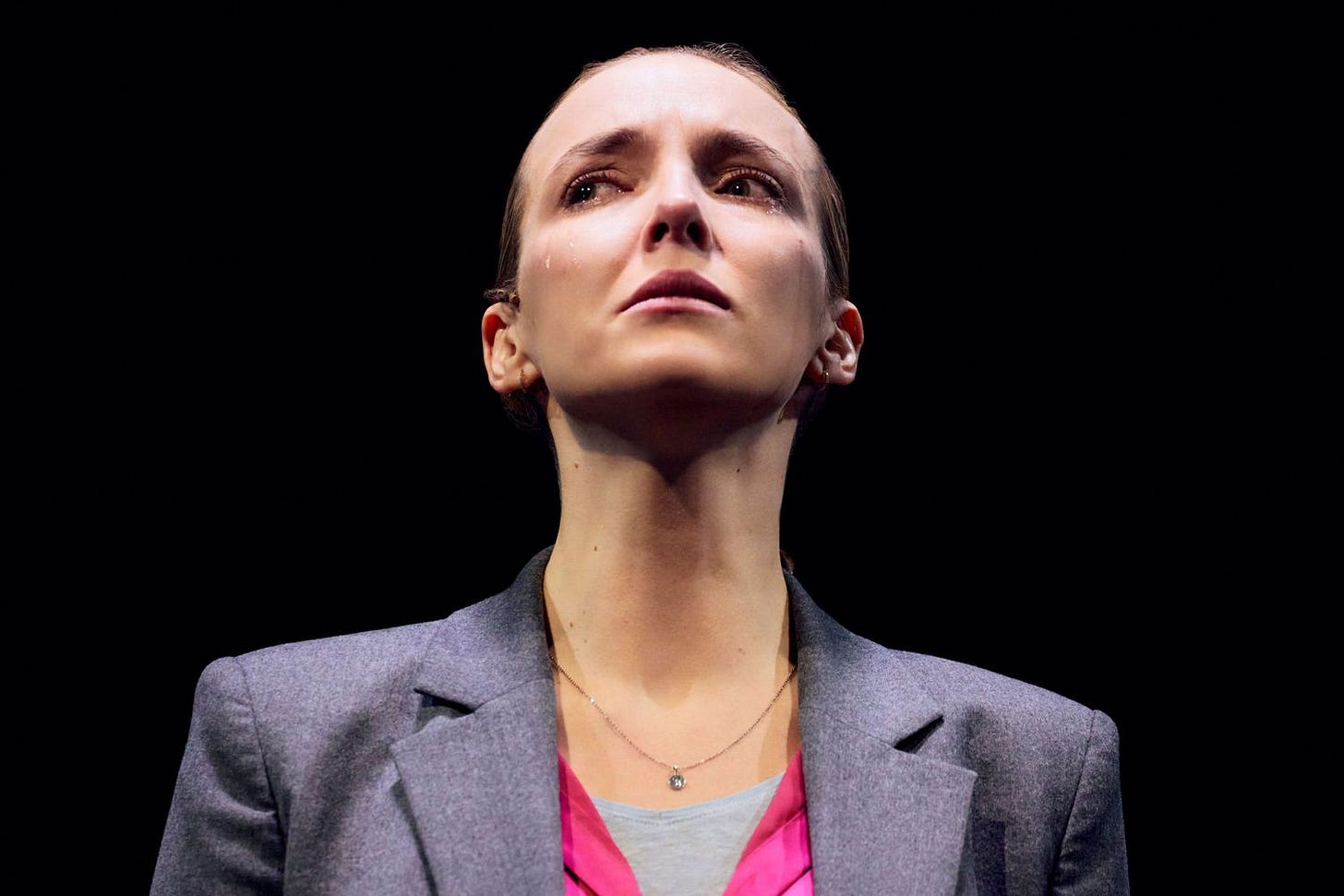
Empire Street Productions. Eleanor Lloyd Productions. Film Nation Entertainment. 2022.
Quoting Her Honour Wendy Joseph KC in Wheeler, 2024:
In the UK, “Females appear to be substantially underrepresented throughout the CJS compared with males. This is particularly true in relation to the most serious offence types and sentences, though patterns by sex vary between individual offences”.
Joseph explains how women and girls are predominantly the victims of rape, domestic violence, and sexual abuse. “When you have seen enough of these cases, you begin to understand how hard it is for a young victim to accept what has happened and how great temptation it is to simply pretend it hasn’t”,
“Since 2010 judges have routinely warned juries to avoid false assumptions, for example that a delayed complaint must be untrue… And there is no normal reaction to a traumatic experience or a normal level of emotion or distress. Juries are also warned that wearing “revealing” clothes, being drunk, or previous consensual sex do not signify consent… Victims are often targeted as those least likely to complain, for fear of being disbelieved. And for a woman or girl who has been physically hurt and/or traumatized, ‘the telling of it’ can be ‘agony’. Medical examination can feel like a further invasion, as can investigation of a complainant’s private life. A contested trial will involve being forcefully challenged and called a liar”.
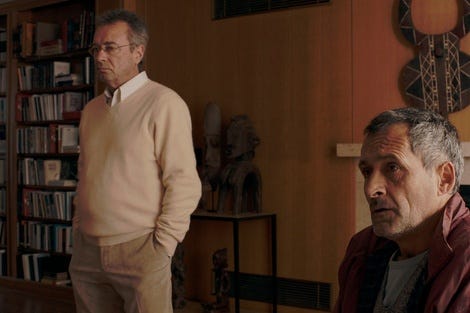
El Deseo. Telefe. Kramer & Sigman Films. Corner Contenidos. 2014.
Trials are more complicated and nuanced than how it is portrayed in The Devil’s Advocate. For starters, only a minority of people get away with murder once they are on trial, like Cullen or Santiago. Those are high-profile trials with large amounts of money involved, in which affording an excellent attorney can be an advantage, but corruption and bribes can also happen. However, we still need to put our trust in the justice system, considering everyone is working their role as best as possible. This doesn’t mean there isn’t space for improvement, and the awareness of it. But we need to acknowledge that although a minority of people are getting away with their crimes, the majority aren’t, and that’s something. We are talking about a justice system in motion, one that needs to decrease the likelihood of guilty people keeping their freedom, one that needs to believe women, and one that actually reforms people instead of only putting them away.
References
Wheeler, Marina. (2024). “Britain’s Justice System is Still Failing Women: A Former Judge Reveals How the Law is Loaded Against Victims of Rape and Domestic Violence”. Available in https://www.newstatesman.com/culture/books/book-of-the-day/2024/07/britains-justice-system-is-still-failing-women
International Bar Association. (2011). International principles on conduct for the legal profession. Retrieved from https://www.icj.org/wp-content/uploads/2014/10/IBA_International_Principles_on_Conduct_for_the_legal_prof.pdf


